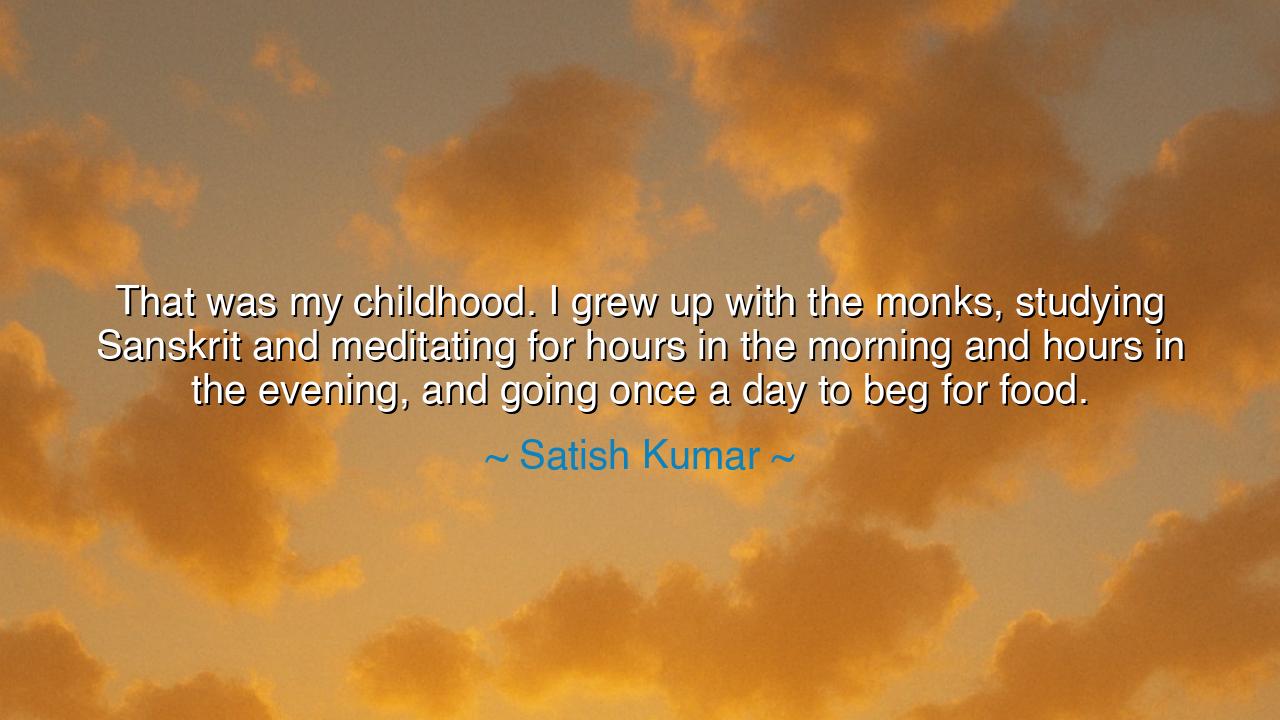
That was my childhood. I grew up with the monks, studying
That was my childhood. I grew up with the monks, studying Sanskrit and meditating for hours in the morning and hours in the evening, and going once a day to beg for food.






Satish Kumar, pilgrim of peace and voice of simplicity, once reflected upon his early years: “That was my childhood. I grew up with the monks, studying Sanskrit and meditating for hours in the morning and hours in the evening, and going once a day to beg for food.” In these words lies not only the story of a boyhood, but the shaping of a soul. For his childhood was not spent in the games of wealth or in the distractions of worldly ambition, but in the discipline of silence, learning, and humility.
The ancients would recognize such a beginning as the seed of wisdom. For Pythagoras, too, taught silence and simplicity to his disciples. The Buddha, born a prince, abandoned riches to live with monks, seeking the truth not in palaces but in forests. The early Christian fathers retreated to deserts to fast, pray, and live by alms. Satish Kumar’s childhood, though modern in time, is ancient in spirit: the shaping of the heart by study, stillness, and surrender.
In his mention of Sanskrit, we hear not merely of language, but of connection to roots that reach deep into the soil of civilization. Sanskrit was the tongue of scriptures, hymns, and wisdom passed down through countless generations. To study it as a child was to drink from a river of philosophy, poetry, and devotion. To meditate, morning and evening, was to enter into that stream, not only learning with the mind but embodying wisdom in the breath, in the stillness of the body, in the awakening of the soul.
And then comes the most humbling image: to go out each day to beg for food. To the proud, such an act may seem shameful, but in truth it is a lesson in dependence, humility, and gratitude. For to live by alms is to remember that life itself is a gift, that sustenance is not earned by pride but shared by compassion. It binds the seeker to the community, reminding him that no matter his spiritual path, he is not apart from the people, but sustained by their kindness.
History gives us examples of this practice shaping greatness. Mahatma Gandhi, too, lived simply, wearing the clothes of the poor, spinning his own cloth, and eating from the humblest fare. By renouncing comfort, he gained a moral authority that no empire could silence. Likewise, Satish Kumar’s childhood among monks taught him the strength of renunciation, so that when he later walked thousands of miles for peace, he did so not with arrogance, but with the humility of one who had already learned to live on little.
The lesson in his words is clear: greatness is not born of wealth or ease, but of discipline, simplicity, and spiritual practice. We must learn, as Kumar did, to begin each day with stillness, to root ourselves in wisdom, to strip away excess, and to remember dependence upon one another. For in such practices the soul grows strong, not weak; the heart grows free, not bound. Childhoods shaped by humility become lives shaped by service.
So, O seekers of truth, hear the teaching hidden in Kumar’s memory. Let your childhood not be forgotten within you, for it holds the roots of your soul. Practice meditation, or silence, or gratitude, not as a burden but as a return to simplicity. Live humbly, even in a world of abundance, and remember that to depend on others is not weakness, but a sacred bond. For in stillness, in humility, and in compassion lies the path of peace — a path walked by monks, by sages, and by those, like Satish Kumar, who chose to carry the flame of wisdom into the modern world.






AAdministratorAdministrator
Welcome, honored guests. Please leave a comment, we will respond soon